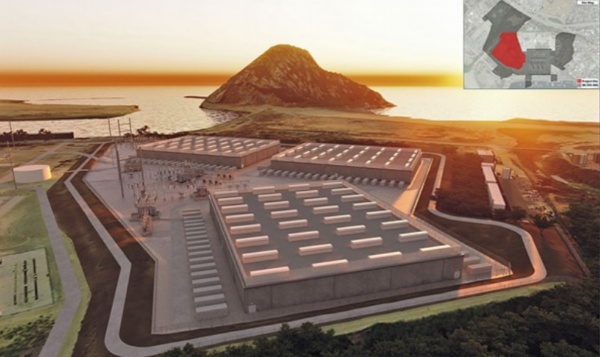Which San Luis Obispo County ballot measures passed?
December 4, 2024

Morro Bay’s proposed battery storage facility
By KAREN VELIE
San Luis Obispo County residents voted to raise sales taxes in three cities, continue electing a treasurer, stop industrialization, and repeal increases in water bills. Here are the final tallies:
Arroyo Grande’s Measure E-24, sales tax increase, passes
Locals agreed to increase the sales tax by 1% with 64.95% voting yes. Arroyo Grande City staff estimates the tax wil result in $6 million a year in additional revenue. Measure E-24 will raise the sales tax rate in Arroyo Grande from 7.75% to 8.75%.
The proposed 1% sales tax increase is set to sunset in ten years.
Atascadero’s Measure L-24, sales tax increase, passes
A measure to extend a 2014 half cent sales tax passed by 70.68% to 29.32%. Atascadero’s sales tax will remain at 8.75%.
Atascadero’s current sales tax rate will continue unless residents vote to repeal it. City staff estimates Measure L-24 will result in $3 million a year in additional revenue.
Atascadero Measure M-24, appoint the city treasurer, fails
Voters rejected a measure to transition from electing a city treasurer to appointing the top financial officer for Atascadero. The vote was close with 50.81% voting against the measure.
Grover Beach Measure G-24, lower water and sewer rates, passes
Voters overwhelmingly approved a measure to repeal Grover Beach’s 112% water and sewer rate increase, in a 64.62% to 34.05% vote.
Morro Bay Measure A-24, requires voter approval for industry on the waterfront, passes
Morro Bay residents approved a measure requiring voter approval for changes to some zoning on the waterfront in a 59.92% to 40.08% vote. While Morro Bay residents won the election, Vistra Energy, the company behind a proposed battery storage facility, decided to seek state approval while bypassing the city’s consideration.
The Morro Bay City Council responded on Nov. 13 by directing staff to construct an urgency ordinance on the potential battery storage project. The council plans to vote on the proposed urgency ordinance in January.
Paso Robles’ Measure I-24, sales tax increase, passes
Voters approved a measure to extend the 2012 half cent sales tax, which was set to expire in 2025, by 54.42% to 45.58%. Paso Robles’ sales tax will remain at 8.75%. The increase will continue unless residents vote to repeal it.
City staff estimate Measure I-24 will result in $5.5 million a year in additional revenue.
Pismo Beach’s Measure F-24, sales tax increase, passes
In line with voters throughout the county, Paso Robles residents approved a measure to increase the sales tax by .5% and to extend a previously approved .5% sales tax measure with a 62.53% to 37.47% vote. The new Pismo Beach sales tax rate will be 8.25%
City staff estimates the increase in sales tax will result in $4 million a year in additional revenue.
Because we believe the public needs the facts, the truth, CalCoastNews has not put up a paywall because it limits readership. However, we are seeking qualification as a paper of record, which will allow us to publish public notices, but it requires 5,000 paid subscribers.
Your subscription will help us to continue investigating and reporting the news.
Support CalCoastNews, subscribe today, click here.






The comments below represent the opinion of the writer and do not represent the views or policies of CalCoastNews.com. Please address the Policies, events and arguments, not the person. Constructive debate is good; mockery, taunting, and name calling is not. Comment Guidelines